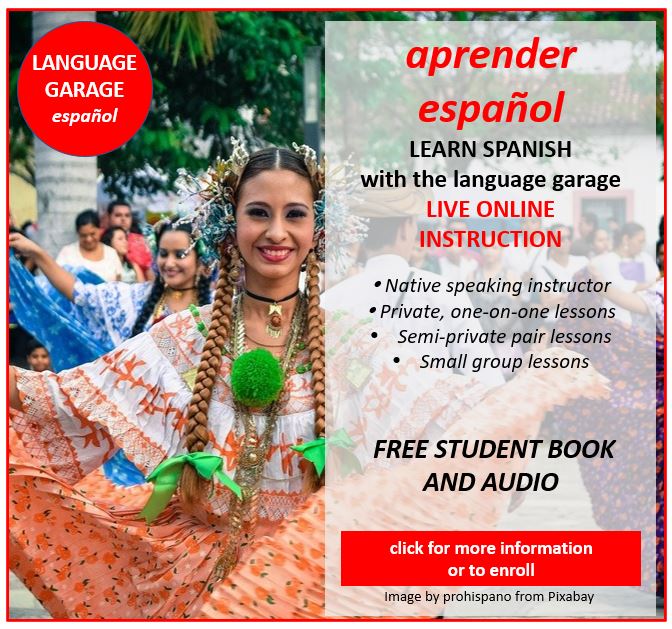Cayó de la palmera: Spanish Irregular Preterite Verbs
In this post we’ll look at Spanish irregular preterite verbs. Most Spanish verbs have regular forms in the past tense, known as the pretérito in Spanish. You can review them here. But many common verbs are irregular in the pretérito. We’ll take a closer look at irregular pretérito verbs in this post.
Irregular Pretérito Endings and Stems
There are two ways that these verbs are irregular. First, the endings are slightly different than the regular pretérito verbs. Remember that the regular pretérito has one set of endings for –ar verbs and another for -er/-ir verbs. Irregular pretérito verbs all use the same set of endings:
| yo | -e | nosotros/as | -imos |
| tú | -iste | vosotros/as | -isteis |
| usted/él/ella | -o | ustedes/ellos/ellas | -ieron |
Second, they use a different stem than in the present. For example, tener (to have) uses the regular stem ten– (tener minus the –er ending) in the present. It’s not totally regular of course, since it adds –g– in the yo form and has a stem vowel change e > ie: tengo (I have), tienes (you have), tiene (he has, she has), tenemos (we have), tenéis (all of you have), tienen (they have).
But in the pretérito, tener uses the stem tuv– plus the endings above: tuve (I had), tuviste (you had), tuvo (he had, she had), tuvimos (we had), tuvisteis (all of you had), tuvieron (they had).
We’ll group irregular pretérito verbs by stem type so that they’re easier to remember.
Verbs with -i- stems
The verbs hacer (to do/make), venir (to come) and querer (to want) have stems with i: hic-, vin-, and quis-. Note that hacer uses hiz– in the usted/él/ella form to keep the /s/ sound, which don’t forget is /th/ in Spain. To conjugate these verbs in the pretérito, just add the irregular pretérito endings.
hacer: hice, hiciste, hizo, hicimos, hicisteis, hicieron
venir: vine, viniste, vino, vinimos, vinisteis, vinieron
querer: quise, quisiste, quiso, quisimos, quisisteis, quisieron
- Quise hacer una pregunta.
I wanted to ask a question. - Quiso entender la razón.
He wanted to understand the reason. - Vinieron hace dos años.
They came two years ago. - Hice mi tarea anoche.
I did my homework last night. - Marta hizo una pregunta.
Marta asked a question.
Verbs with -uv- stems
Tener (to have), estar (to be) and andar (to walk) all have irregular pretérito stems with uv.
estar: estuve, estuviste, estuvo, estuvimos, estuvisteis, estuvieron
tener: tuve, tuviste, tuvo, tuvimos, tuvisteis, tuvieron
andar: anduve, anduviste, anduvo, anduvimos, anduvisteis, anduvieron
- ¿Dónde estuvieron ayer?
Where were they yesterday? - Estuve en casa.
I was home. - Nunca tuviste los síntomas.
You never had the symptoms. - Esta mañana tuvo una reunión muy larga.
She had a very long meeting this morning. - Anduve cinco kilómetros y llegué al parque.
I walked five kilometers and arrived at the park.
Verbs with -u- stems
The verbs poder (can, to be able), poner (to put), saber (to know), caber (to fit) and haber (to have, auxiliary verb) all have stems with u in the pretérito.
poder: pude, pudiste, pudo, pudimos, pudisteis, pudieron
poner: puse, pusiste, puso, pusimos, pusisteis, pusieron
saber: supe, supiste, supo, supimos, supisteis, supieron
caber: cupe, cupiste, cupo, cupimos, cupisteis, cupieron
haber: hube, hubiste, hubo, hubimos, hubisteis, hubieron
Saber in the pretérito can have the sense of found out or knew how, and poder in the pretérito has the sense of managed to.
- Supe la verdad.
I found out the truth. - Supieron contestar correctamente.
They knew how to answer correctly. - ¿No pudiste ayudarlo?
You weren’t able/didn’t manage to help him? - Finalmente pude hacerlo.
Finally I managed to/was able to do it. - Me puse una camisa nueva.
I put on a new shirt. - No cupo en la maleta.
It didn’t fit in the suitcase.
Haber is used to mean there is/there are, with the form hay in the present. In the past, it’s hubo.
- Hubo una tormenta.
There was a storm. - Hubo muchas personas.
There were a lot of people.
Verbs with stems that end in vowels
A couple of common verbs that have stems ending in vowels followed a different pattern. These are leer (to read), caer (to fall), oír (to hear) and concluir (to conclude). They take endings similar to the regular -er/-ir pretérito endings [link], there’s an accented vowel in all of the endings but ellos/ellas, and they use –y– in the él/ella and ellos/ellas forms. Also notice that the ellos/ellas ending in –eron and not –ieron after y. (You may have noticed that i becomes y elsewhere in Spanish, for example: caer > cayendo, leer > leyendo, oír > oyendo.)
leer: leí, leíste, leyó, leímos, leísteis, leyeron
caer: caí, caíste, cayó, caímos, caísteis, cayeron
oír: oí, oíste, oyó, oímos, oísteis, oyeron
concluir: concluí, concluiste, concluyó, concluimos, concluisteis, concluyeron
- ¿Cuándo leíste ese libro?
When did you read that book? - Leí un artículo interesante esta mañana.
I read an interesting article this morning. - Un coco cayó de la palmera.
A coconut fell from the palm tree. - Oyó un ruido fuerte.
She heard a loud noise. - Los tribunales concluyeron que no hubo discriminación.
The courts concluded that there was no discrimination.
Verbs with stems ending in j
The verbs decir (to say), traer (to bring), conducir (to drive, to conduct), producir (to produce) and traducir (to translate) all have past stems ending in j. Notice also the decir has an i in the past stem. The endings are all the irregular pretérito endings, but the ellos/ellas form uses –eron instead of –ieron after j.
decir: dije, dijiste, dijo, dijimos, dijisteis, dijeron
traer: traje, trajiste, trajo, trajimos, trajisteis, trajeron
conducir: conduje, condujiste, condujo, condujimos, condujisteis, condujeron
producir: produje, produjiste, produjo, produjimos, produjisteis, produjeron
traducir: traduje, tradujiste, tradujo, tradujimos, tradujisteis, tradujeron
- ¿Qué dijiste?
What did you say? - Me dijeron que no valía la pena.
They told me it wasn’t worth it. - ¿Qué trajo a la fiesta?
What did she bring to the party? - Condujimos nuestro negocio de manera ética.
We conducted our business ethically. - Produjeron mucho vino en esta región.
They produced a lot of wine in this region. - ¿Quién tradujo el informe?
Who translated the report?
-ir verbs with stem vowel changes
Several –ir verbs have stem vowel changes in the pretérito: sentir (to feel), pedir (to ask for), dormir (to sleep), consequir (to get/obtain), vestirse (to get dressed), repetir (to repeat), morir (to die), servir (to serve), divertirse (to have fun), sugerir (to suggest). The stem vowel changes happen in the él/ella and ellos/ellas forms, and the endings are the regular pretérito endings for -er/-ir verbs.
sentir: sentí, sentiste, sintió, sentimos, sentisteis, sintieron
pedir: pedí, pediste, pidió, pedimos, pedisteis, pidieron
dormir: dormí, dormiste, durmió, dormimos, dormisteis, durmieron
conseguir: conseguí, conseguiste, consiguió, conseguimos, conseguisteis, consiguieron
vestirse: me vestí, te vestiste, se vistió, nos vestimos, os vestisteis, se vistieron
repetir: repetí, repetiste, repitió, repetimos, repetisteis, repitieron
morir: morí, moriste, murió, morimos, moristeis, murieron
servir: serví, serviste, sirvió, servimos, servisteis, sirvieron
divertirse: me divertí, te divertiste, se divirtió, nos divertimos, os divertisteis, se divirtieron
sugerir: sugerí, sugeriste, sugirió, sugerimos, sugeristeis, sugirieron
- ¿Te sentiste mejor?
Did you feel better? - Pedimos otra habitación.
We asked for another room. - ¿Cuántas horas durmió?
How many hours did she/he sleep? - ¿Dónde conseguiste un nuevo trabajo?
Where did you get a new job? - Se vistieron y salieron.
They got dressed and went out. - La profesora repitió la frase muchas veces.
The teacher repeated the phrase many times. - Esta autora murió hace cincuenta años.
This author died fifty years ago. - ¿Qué sirvió anoche en la cena?
What did he serve last night for dinner? - Nos divertimos durante el viaje.
We had fun during the trip. - Sugirieron una nueva solución.
They suggested a new solution.
Irregular Irregulars
A few common verbs have irregular pretérito forms that don’t quite fit into any of these patterns. Ser (to be) and ir (to go) share pretérito forms, but you can of course tell them apart from context. The others in this group are dar (to give), ver (to see), and reír (to laugh)/sonreír (to smile.)
ser/ir: fui, fuiste, fue, fuimos, fuisteis, fueron
dar: di, diste, dio, dimos, disteis, dieron
ver: vi, viste, vio, vimos, visteis, vieron
(son)reír: reí, reíste, rio, reímos, reísteis, rieron
- Fueron la inspiración para su arte.
They were the inspiration for his/her art. - Fuimos a la playa el fin de semana pasado.
We went to the beach last weekend. - ¿Quién te dio este número de teléfono?
Who gave you this phone number? - Vimos una muy buena película.
We saw a very good movie. - Te reíste de mi.
You laughed at me. - Sonrió y dijo hola.
She smiled and said hello.
Practice
Finally, let’s practice the irregular preterite. Transform each of the following sentences from the present to the preterite. Then translate. Answers and translations are given below.
- Yo tengo una bicicleta nueva.
- Tú haces la tarea todas las noches.
- Ella dice la verdad a su amigo.
- Nosotros queremos ir al parque.
- Ustedes traen los libros a clase.
- Ellos pueden nadar muy rápido.
- Yo voy al supermercado.
- Tú vienes a mi casa después de la escuela.
- Él sabe la respuesta a la pregunta.
- Nosotros estamos en el cine.
- Ellas ponen la mesa para la cena.
- Yo doy un regalo a mi mejor amigo.
- Tú lees un libro interesante.
- Ella oye música en el parque.
- Nosotros vemos una película juntos.
- Ustedes andan en bicicleta por el parque.
- Yo quiero aprender a tocar el piano.
- Tú traes los ingredientes para la receta.
- Él conduce muy rápido en la autopista.
- Nosotros decimos buenos días al maestro.
- Ellos tienen mucha hambre después de correr.
- Yo vengo temprano a la reunión.
- Tú vas a la fiesta con tus amigos.
- Ella sabe hablar tres idiomas.
- Nosotros podemos terminar el proyecto.
- Ellas traen comida al picnic.
- Yo pongo el libro en la mesa.
- Tú haces ejercicio por la mañana.
- Él da una flor a su mamá.
- Nosotros vemos el amanecer desde la montaña.
Answers
- Yo tuve una bicicleta nueva. (I had a new bike.)
- Tú hiciste la tarea todas las noches. (You did homework every night.)
- Ella dijo la verdad a su amigo. (She told the truth to her friend.)
- Nosotros quisimos ir al parque. (We wanted to go to the park.)
- Ustedes trajeron los libros a clase. (You all brought the books to class.)
- Ellos pudieron nadar muy rápido. (They could swim very fast.)
- Yo fui al supermercado. (I went to the supermarket.)
- Tú viniste a mi casa después de la escuela. (You came to my house after school.)
- Él supo la respuesta a la pregunta. (He found out the answer to the question.)
- Nosotros estuvimos en el cine. (We were at the cinema.)
- Ellas pusieron la mesa para la cena. (They set the table for dinner.)
- Yo di un regalo a mi mejor amigo. (I gave a gift to my best friend.)
- Tú leíste un libro interesante. (You read an interesting book.)
- Ella oyó música en el parque. (She heard music in the park.)
- Nosotros vimos una película juntos. (We watched a movie together.)
- Ustedes anduvieron en bicicleta por el parque. (You all rode bicycles through the park.)
- Yo quise aprender a tocar el piano. (I wanted to learn to play the piano.)
- Tú trajiste los ingredientes para la receta. (You brought the ingredients for the recipe.)
- Él condujo muy rápido en la autopista. (He drove very fast on the highway.)
- Nosotros dijimos buenos días al maestro. (We said good morning to the teacher.)
- Ellos tuvieron mucha hambre después de correr. (They were very hungry after running.)
- Yo vine temprano a la reunión. (I came early to the meeting.)
- Tú fuiste a la fiesta con tus amigos. (You went to the party with your friends.)
- Ella supo hablar tres idiomas. (She found out how to speak three languages.)
- Nosotros pudimos terminar el proyecto. (We managed to finish the project.)
- Ellas trajeron comida al picnic. (They brought food to the picnic.)
- Yo puse el libro en la mesa. (I put the book on the table.)
- Tú hiciste ejercicio por la mañana. (You exercised in the morning.)
- Él dio una flor a su mamá. (He gave a flower to his mom.)
- Nosotros vimos el amanecer desde la montaña. (We saw the sunrise from the mountain.)
Get on the road to speaking Spanish with the Language Garage!
We hope you’ve enjoyed learning about Spanish irregular preterite verbs. If you’re interested in learning more, check out our other posts on Spanish language, culture, and more. If you’re looking for convenient and affordable live Spanish lessons with a real teacher, visit The Language Garage. Our lessons are affordable and fun, and they’re given online in a virtual classroom, so it doesn’t matter where you live or work – we can come to you. We have flexible options, with a free trial so that you can decide if there’s a fit. Check us out!
Image by Sebastian Kopf from Pixabay.






